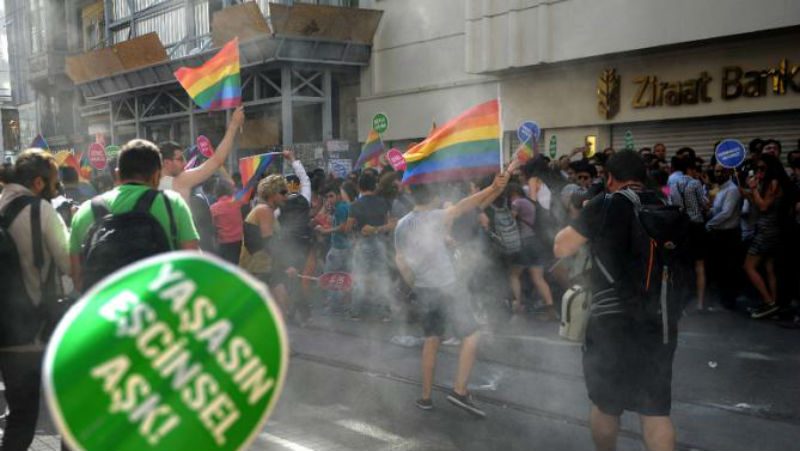The International Gay & Lesbian Human Rights Commission condemns Turkish Police response to Pride Event
The International Gay and Lesbian Human Rights Commission (IGLHRC) condemned the Turkish government’s use of pepper spray, water cannons, and rubber bullets to stop the 13th Istanbul lesbian, gay, bisexual, transgender, and intersex (LGBTI) Pride Parade, which was scheduled to take place on Sunday, June 28.
According to eyewitness accounts, as people started to arrive at the scene of the Pride Parade on Sunday afternoon, police forces started to escalate tension, first by preventing the speakers from reading their press releases, then by arresting journalists, later by chasing the peaceful crowd and eventually using tear gas and pressurized water against them. In the course of the afternoon, police used indiscriminate force against journalists who were covering the events, marchers who held political banners, and several members of the new Turkish Parliament who were holding hands in front of the police barricade, trying to shield the protesters against police brutality.
The government referred to shutting down the parade as a “ban” and has not, in statements, addressed the police’s use of force.
“The Turkish government has a responsibility to protect peaceful assembly, including the annual LGBTI pride parade,” said Jessica Stern, Executive Director of IGLHRC. “Instead, the police attacked peaceful marchers with water cannons, pepper spray, and plastic bullets. To add insult to injury, the government refuses to even acknowledge the violence of their actions.”
Initially, the organizers were told that the authorities wanted to stop the parade because it interfered with the Muslim holy month of Ramadan. Istanbul’s governor personally told HDP (The Peoples’ Democratic Party) Istanbul Member of Parliament Filiz Kerestecioğlu that this was the reason for the ban during a taped phone conversation.
On Monday however, the Istanbul Governorate issued a statement, citing security concerns as the primary reason for the last-minute ban. The government statement claimed the ban was, “based on intelligence gathered from the social media and the media outlets … that some groups may react to this [pride parade].”
“The authorities in Turkey keep changing their story about what happened,” said Hossein Alizadeh, IGLHRC program coordinator for the Middle East and North Africa. “However, media reports about police only resorting to force after some demonstrators erected banners to protest the government indicate the real interest might very well have been to silence anti-government voices.”
This is the first time in over a decade that the LGBTI community in Turkey was not allowed to carry out this annual Pride event, a tradition that started back in 2003. The organizers of Istanbul Pride worked for weeks to plan a week-long celebration of diversity, which was scheduled to end with the Istanbul Pride parade. Among dignitaries who planned to attend the parade were five newly-elected Members of Parliament from the Republican People’s Party (CHP) and The Peoples’ Democratic Party (HDP).
The crackdown on the parade comes weeks after the parliamentary election on June 7, when the ruling Justice and Development Party (AKP) lost its decade-long majority in Parliament. Two days before the election at a campaign rally, President Recep Tayyip Erdoğan publicly said homosexuals were the, “representatives of sedition.” Despite anti-LGBTI propaganda by the government, in the June 7 election, 22 LGBT allies from CHP and HDP parties were elected to Parliament.
